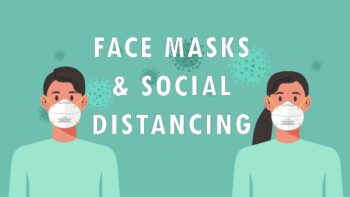Every day brings new information, concerns, government directives, and challenges regarding the COVID-19 pandemic. Leap Solutions’ HR specialists can help manage pandemic-related complexities that may impact you and your employees. We are dedicated to keeping you informed and empowered with relevant, up-to-the-minute information and resources, working with you to develop practical solutions and smart planning decisions for your organization.
In this issue of our newsletter:
- Determining the company position about employee vaccinations.
- What if an employee refuses to receive a vaccination?
- What are the best practices once employees are vaccinated?
- Reviewing and applying anti-harassment, and retaliation policies, regarding vaccinations

Can I require my employee to get the COVID-19 vaccination?
Yes, but…
Your business can require all employees and applicants to get vaccinated, but first consider simply encouraging employees to get the vaccine.
There are important considerations before making that decision. If an employee refuses to get the vaccine, the best action is a conversation to find out the reason for the refusal. If due to a disability or a sincerely held religious practice or belief, the employer is required to engage in an interactive process and determine if there is a reasonable accommodation that can be made.
Before requiring employees to take a COVID-19 Vaccine
Conduct an assessment to determine if there is a direct threat in the workplace:
What accommodations will I be able/willing to make for employees who refuse or are unable to be vaccinated?
- Are employees able to work remotely?
- Am I willing to terminate a good employee whose refusal isn’t connected to a disability or religious belief?
What is/are the direct threat(s)?
- For example, do multiple employees live in the same company housing?
Note that employee time spent getting a mandatory vaccination may be compensable.
There may be liability if employees have reactions to mandated vaccinations, and may be included as part of a workers’ compensation claim.
What if my employee says, “I can’t get vaccinated because of my disability.”
The Americans with Disabilities Act (ADA) requires an employer to provide reasonable accommodations to employees with disabilities so long as the accommodation does not place an undue hardship on the employer. If an employee is unable to receive the vaccine because of a disability, the ADA requires an interactive process between the employer and the employee once an accommodation is requested. Some underlying health issues that place an individual at high risk during the pandemic may qualify as a disability and necessitate reasonable accommodations. The ADA allows an employer to have a qualification standard (i.e., is shown to be job-related for the position in question and is consistent with business necessity) that includes “a requirement that an individual shall not pose a direct threat to the health or safety of individuals in the workplace.” If a safety-based qualification standard, such as a vaccination requirement, screens out or tends to screen out an individual with a disability, the employer must show that an unvaccinated employee would pose a direct threat due to a “significant risk of substantial harm to the health or safety of the individual or others that cannot be eliminated or reduced by reasonable accommodation.”
Employers should conduct an individualized assessment to determine if a direct threat exists: the duration of the risk; the nature and severity of the potential harm; the likelihood that the potential harm will occur; and the imminence of the potential harm.
A direct threat would include a determination that an unvaccinated individual will expose others at the worksite to the virus. This may be difficult to prove if your business has been operating over the last 12 months without a work-related COVID-19 exposure.

Can an employee refuse a COVID-19 vaccination because of a sincerely held religious practice or belief?
Once an employer is aware that an employee’s sincerely held religious belief, practice, or observance prevents the employee from receiving the vaccination, a reasonable accommodation is required unless the accommodation poses an undue hardship under Title VII of the Civil Rights Act. (Courts have defined “undue hardship” under Title VII as having more than a de minimis cost or burden on the employer.)Because the definition of religion is broad and protects beliefs, practices, and observances of which the employer may be unfamiliar, employers should ordinarily assume a request for religious accommodation is based on a sincerely held religious belief.
If an employer has an objective basis for questioning the nature or the sincerity of a particular belief, practice, or observance, the employer is justified in requesting additional supporting information.
The interactive process
The interactive process is a collaborative effort between the employer and the employee to determine what, if any, accommodation can help the employee perform the job’s essential functions. It requires an assessment of the job and the individual’s specific physical or mental limitations directly related to the reasonable accommodation. The employer should meet with the employee or applicant to discuss possible reasonable accommodations; be open to the employee’s or applicant’s suggestions.; be willing to try various accommodations, and document this process.
Examples of reasonable accommodations include: allowing telework; modified work schedules; limited changes to working conditions; the use of paid or unpaid leave; and providing protective gear, like N95 masks or respirators, or alternative protective gear, i.e., non-latex gloves for employees with latex allergies.
The employee may suggest an accommodation, and the employer may offer alternatives for reasonable accommodations, and discuss their potential effectiveness for removing the workplace barrier. The employer should consider the employee’s preference(s) but has the right to select and implement an accommodation that’s effective for employer and employee.

What if the vaccination is mandatory and the employer cannot accommodate a medical or religious accommodation?
Be careful…
Sometimes an accommodation is not possible, but employers should look to CDC for accommodation recommendations. Always document this process. Consulting legal counsel is recommended. If a disability or sincerely held religious belief, practice, or observance prevents an employee from being vaccinated and there is no reasonable accommodation, then the employer can lawfully exclude the employee from the workplace. This does not mean the employer may automatically terminate the worker. Other rights might apply under the Equal Employment Opportunity laws or federal, state, and local authorities.
Before excluding an employee from the worksite be sure you have documented an individualized assessment of the employee and the potential harm to others that can’t otherwise be significantly reduced or eliminated through workplace accommodations. Seeking legal counsel for such a situation is encouraged.
Can I ask to see proof of a COVID-19 vaccination?
Yes, but…

Can employees stop practicing other preventive measures such as social distancing and wearing masks after receiving the vaccine?
NO!
The CDC recommends people continue preventive measures after being vaccinated.
Continue critical preventive measures including wearing a mask, staying six feet away from others, avoiding crowds, washing hands often, and cleaning high-touch surfaces frequently. It takes time to build protection after any vaccination, and the COVID-19 vaccine may not protect someone until a week or two after the second shot (dose).
Getting vaccinated and following the CDC’s recommendations are the best protections from getting and spreading COVID-19.
If an employee has already had COVID-19, should they still get vaccinated?
It’s Recommended
The CDC recommends that COVID-19 vaccinations be offered to workers regardless of whether they already had COVID-19. It is still unknown how long protection lasts for those who have been infected or vaccinated. Workers should not be required to have an antibody test before or after they are vaccinated.
What if a handful of employees refuse even though most of your staff voluntarily agrees to get vaccinated?
Some employees may not get vaccinated if it’s not mandatory. The company must protect all employees who do not get the vaccination from discrimination or harassment by co-workers, supervisors, or others in the workplace who believe everyone should get vaccinated.
When a business does not mandate vaccination, no employee is required to explain his or her reasoning for not being vaccinated. It should be made clear to all employees (specifically management) that incidents of harassment or retaliation, including incidents related to someone not getting the vaccination, are not tolerated and should be reported.


![]()